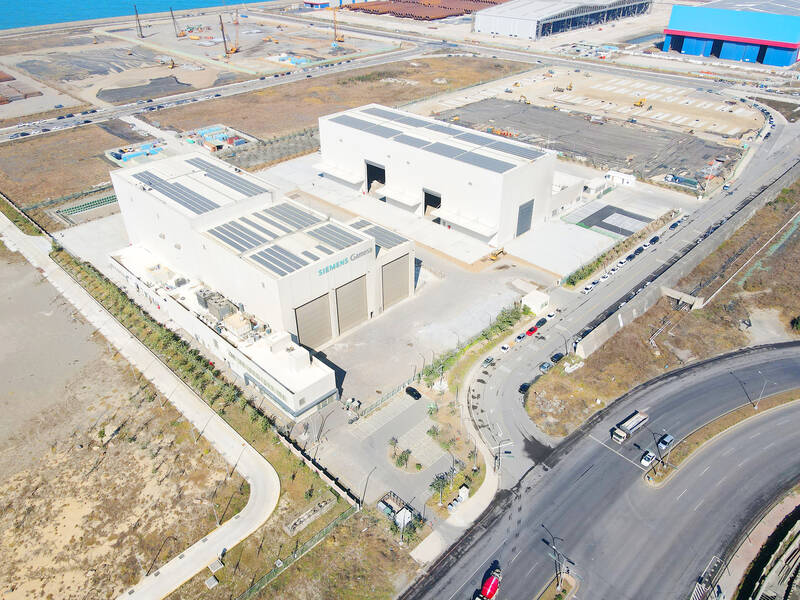Wind turbine manufacturer Siemens Gamesa Renewable Energy SA said in a statement yesterday that the expansion of its nacelle assembly plant in Taichung would be completed a month ahead of schedule and begin operations in the second quarter next year.
The plant is the company’s first assembly facility for nacelles for offshore wind units outside of Europe and Taiwan’s only one, it said.
Following completion of the work, the plant at the Port of Taichung would have annual production capacity of 2 gigawatts, creating more job opportunities, Siemens Gamesa said.

Photo courtesy of Siemens Gemesa Renewable Energy SA
The company is recruiting 300 people to meet rising demand for talent in the industry.
It sent its first batch of Taiwanese employees to a one-year advanced training course in Europe late last year, it added.
Siemens Gamesa started the expansion of the plant in September last year and had expected to complete construction in February.
However, it now expects the construction of two production halls, one warehouse and other ancillary facilities to be completed early next month, it said.
After the installation of manufacturing equipment, the new facilities would produce large offshore wind turbines and continue the firm’s collaboration with the local industry chain, it added.
Besides supporting the 1,044 megawatt Hai Long Offshore Wind Power Project (海龍離岸風電計畫) off Changhua County, the new facilities would help complete a third-phase offshore wind farm development plan drawn up by the Ministry of Economic Affairs, the company said.
The company is looking forward to joining hands with the local supply chain to export Taiwan-made nacelles to projects in the Asia-Pacific region with the completion of the expansion project, Siemens Gamesa said.
“The expansion of the Taichung nacelle plant will further fulfill our commitment to the development of offshore wind power in Taiwan and the Asia-Pacific region,” Siemens Gamesa Offshore for Asia-Pacific chairman and managing director Niels Steenberg said in the statement.
Taiwan has 283 offshore wind turbines, of which Siemens Gamesa contributed 210, more than 75 percent, ministry data showed.

When an apartment comes up for rent in Germany’s big cities, hundreds of prospective tenants often queue down the street to view it, but the acute shortage of affordable housing is getting scant attention ahead of today’s snap general election. “Housing is one of the main problems for people, but nobody talks about it, nobody takes it seriously,” said Andreas Ibel, president of Build Europe, an association representing housing developers. Migration and the sluggish economy top the list of voters’ concerns, but analysts say housing policy fails to break through as returns on investment take time to register, making the

‘SILVER LINING’: Although the news caused TSMC to fall on the local market, an analyst said that as tariffs are not set to go into effect until April, there is still time for negotiations US President Donald Trump on Tuesday said that he would likely impose tariffs on semiconductor, automobile and pharmaceutical imports of about 25 percent, with an announcement coming as soon as April 2 in a move that would represent a dramatic widening of the US leader’s trade war. “I probably will tell you that on April 2, but it’ll be in the neighborhood of 25 percent,” Trump told reporters at his Mar-a-Lago club when asked about his plan for auto tariffs. Asked about similar levies on pharmaceutical drugs and semiconductors, the president said that “it’ll be 25 percent and higher, and it’ll

CHIP BOOM: Revenue for the semiconductor industry is set to reach US$1 trillion by 2032, opening up opportunities for the chip pacakging and testing company, it said ASE Technology Holding Co (日月光投控), the world’s largest provider of outsourced semiconductor assembly and test (OSAT) services, yesterday launched a new advanced manufacturing facility in Penang, Malaysia, aiming to meet growing demand for emerging technologies such as generative artificial intelligence (AI) applications. The US$300 million facility is a critical step in expanding ASE’s global footprint, offering an alternative for customers from the US, Europe, Japan, South Korea and China to assemble and test chips outside of Taiwan amid efforts to diversify supply chains. The plant, the company’s fifth in Malaysia, is part of a strategic expansion plan that would more than triple

Taiwanese artificial intelligence (AI) server makers are expected to make major investments in Texas in May after US President Donald Trump’s first 100 days in office and amid his rising tariff threats, Taiwan Electrical and Electronic Manufacturers’ Association (TEEMA, 台灣電子電機公會) chairman Richard Lee (李詩欽) said yesterday. The association led a delegation of seven AI server manufacturers to Washington, as well as the US states of California, Texas and New Mexico, to discuss land and tax issues, as Taiwanese firms speed up their production plans in the US with many of them seeing Texas as their top option for investment, Lee said. The